
The Top 9 Superfoods for Optimal Health
Do you want to live a long, healthy life? Of course, you do! Who doesn't want to feel their best every day? Well, the secret to a healthy and energetic life is not just exercise and good sleep, but also what you put in your body. And that's where superfoods come in!
Superfoods are nutrient-dense foods that pack a powerful punch of vitamins, minerals, and antioxidants. They are the superheroes of the food world, providing numerous health benefits and helping to prevent chronic diseases. But with so many superfoods to choose from, it can be overwhelming to know which ones to add to your diet. That's where we come in!
In this blog, we'll be diving into the top 9 superfoods that will help you achieve optimal health. From sweet potatoes to Greek yogurt, we'll explore the nutritional value, health benefits, and easy ways to incorporate these superfoods into your diet. And, we promise to keep the information light and entertaining, with a sprinkle of humor to make your reading experience enjoyable. So, buckle up and let's get started on the journey to optimal health with these superfoods!
1. Blueberries
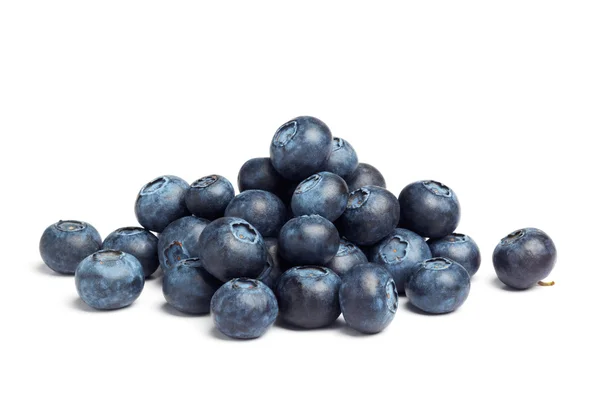
A. Nutritional Benefits Blueberries are a nutrient-dense fruit that contain a high level of antioxidants, vitamin C, and fiber. One cup of blueberries contains 24% of the recommended daily intake of vitamin C and 36% of the recommended daily intake of fiber. Additionally, blueberries are low in calories, with only 84 calories per cup.
B. How to Incorporate in Diet Blueberries can be added to many different foods and drinks, such as smoothies, yogurt, oatmeal, or even just as a snack on their own. They can also be used as a topping for desserts or added to baking recipes.
C. Health Benefits Blueberries have been linked to many health benefits, such as improving heart health, promoting healthy brain function, and preventing certain types of cancer. They are also thought to help reduce inflammation, boost the immune system, and improve digestion.
In conclusion, incorporating blueberries into a daily diet can bring many health benefits and provide the body with essential vitamins, minerals, and antioxidants. Whether eaten raw or added to other foods, blueberries are a delicious and nutritious addition to any meal.
2. Salmon

A. Nutritional Benefits Salmon is a nutritious fish that is rich in omega-3 fatty acids, protein, and vitamin D. One serving of salmon provides approximately 20 grams of protein and nearly 100% of the recommended daily intake of vitamin D. Additionally, salmon is low in saturated fat and contains heart-healthy omega-3 fatty acids.
B. How to Incorporate in Diet Salmon can be cooked in many different ways, including grilling, baking, poaching, and pan-frying. It can also be added to salads, sandwiches, and pasta dishes.
C. Health Benefits Salmon has been linked to many health benefits, such as reducing the risk of heart disease, improving brain health, and helping to manage depression and anxiety. Additionally, the omega-3 fatty acids found in salmon can help reduce inflammation and improve joint health. Eating salmon may also help improve weight management and support healthy aging.
In conclusion, incorporating salmon into a daily diet can bring many health benefits and provide the body with essential vitamins, minerals, and omega-3 fatty acids. Whether enjoyed as a main course or added to other dishes, salmon is a delicious and nutritious addition to any meal.
3. Avocados
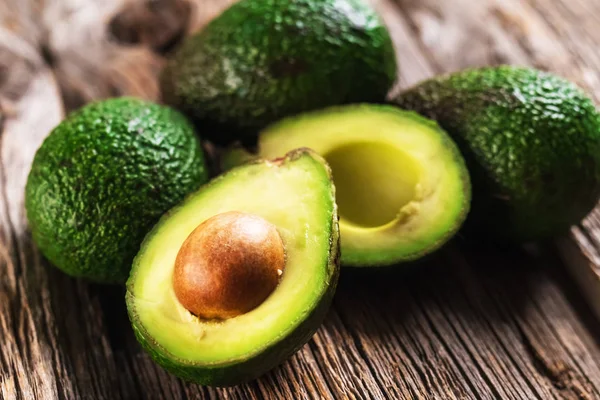
A. Nutritional Benefits Avocados are a nutrient-dense fruit that are rich in healthy monounsaturated fats, fiber, and a variety of vitamins and minerals. One avocado contains approximately 15 grams of healthy monounsaturated fats, 12 grams of fiber, and provides nearly 20% of the recommended daily intake of potassium. Additionally, avocados are low in saturated fat and cholesterol-free.
B. How to Incorporate in Diet Avocados can be used in a variety of ways, such as sliced on toast, mashed into guacamole, or added to smoothies and salads. They can also be used as a substitute for mayonnaise or sour cream in many recipes.
C. Health Benefits Avocados have been linked to many health benefits, such as improving heart health, reducing the risk of type 2 diabetes, and promoting weight management. The monounsaturated fats found in avocados can also help reduce inflammation and improve brain health. Additionally, the fiber in avocados can help support digestive health and maintain healthy blood sugar levels.
In conclusion, incorporating avocados into a daily diet can bring many health benefits and provide the body with essential vitamins, minerals, and healthy monounsaturated fats. Whether enjoyed on their own or added to other dishes, avocados are a delicious and nutritious addition to any meal.
4. Spinach

A. Nutritional Benefits Spinach is a nutrient-rich leafy green vegetable that is high in vitamins, minerals, and antioxidants. One cup of cooked spinach contains approximately 6 grams of protein, over 200% of the recommended daily intake of vitamin K, and 15% of the recommended daily intake of fiber. Additionally, spinach is low in calories and high in nutrients.
B. How to Incorporate in Diet Spinach can be added to salads, soups, stews, and smoothies. It can also be used as a base for dips, such as spinach and artichoke dip, or added to pasta dishes, such as spinach and ricotta stuffed shells.
C. Health Benefits Spinach has been linked to many health benefits, such as improving heart health, promoting healthy skin and hair, and reducing the risk of certain types of cancer. Additionally, the antioxidants found in spinach can help reduce inflammation and protect against cellular damage. The vitamin K in spinach can also help support healthy bones and maintain healthy blood clotting.
In conclusion, incorporating spinach into a daily diet can bring many health benefits and provide the body with essential vitamins, minerals, and antioxidants. Whether enjoyed raw or cooked, spinach is a delicious and nutritious addition to any meal.
5. Chia Seeds 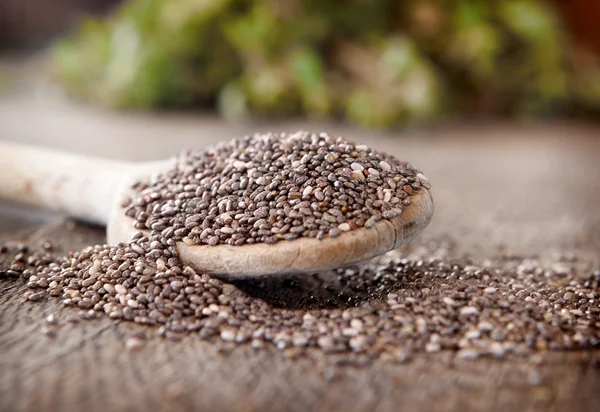

A. Nutritional Benefits Chia seeds are small but powerful seeds that are high in fiber, protein, and omega-3 fatty acids. One ounce of chia seeds contains approximately 4 grams of protein, 11 grams of fiber, and 5 grams of omega-3 fatty acids. Additionally, chia seeds are low in calories and are a good source of vitamins and minerals.
B. How to Incorporate in Diet Chia seeds can be added to smoothies, oatmeal, yogurt, and baked goods. They can also be used to thicken sauces and soups, or as a substitute for eggs in baking recipes.
C. Health Benefits Chia seeds have been linked to many health benefits, such as improving heart health, boosting the immune system, and promoting healthy digestion. Additionally, the fiber in chia seeds can help maintain healthy blood sugar levels and promote weight management. The omega-3 fatty acids found in chia seeds can also help reduce inflammation and support healthy brain function.
In conclusion, incorporating chia seeds into a daily diet can bring many health benefits and provide the body with essential vitamins, minerals, and healthy fats. Whether enjoyed on their own or added to other foods, chia seeds are a delicious and nutritious addition to any meal.
6. Quinoa
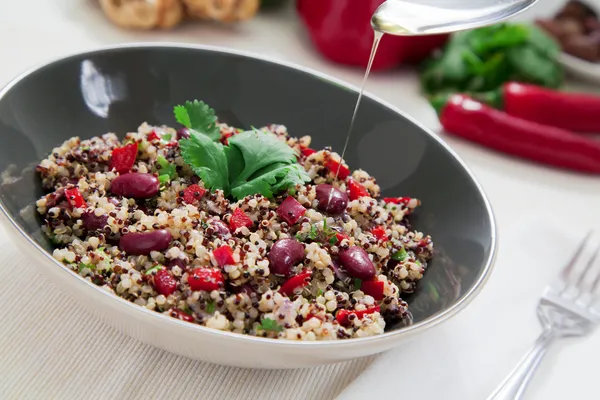
A. Nutritional Benefits Quinoa is a high-protein grain that is also rich in fiber, vitamins, and minerals. One cup of cooked quinoa contains approximately 8 grams of protein, 5 grams of fiber, and provides the body with essential vitamins and minerals such as magnesium, iron, and potassium. Additionally, quinoa is gluten-free and is considered a complete protein, as it contains all 9 essential amino acids.
B. How to Incorporate in Diet Quinoa can be used as a substitute for rice or pasta in many dishes, or added to salads and soups. It can also be used as a base for grain bowls, or mixed with other ingredients to make veggie burgers or patties.
C. Health Benefits Quinoa has been linked to many health benefits, such as improving heart health, promoting healthy digestion, and boosting the immune system. Additionally, the high protein content in quinoa can help support muscle health and growth. The fiber in quinoa can also help maintain healthy blood sugar levels and promote weight management.
In conclusion, incorporating quinoa into a daily diet can bring many health benefits and provide the body with essential vitamins, minerals, and high-quality protein. Whether enjoyed on their own or added to other dishes, quinoa is a delicious and nutritious addition to any meal.
7. Sweet Potatoes

A. Nutritional Benefits Sweet potatoes are a nutritious root vegetable that is high in fiber, vitamins, and minerals. One medium sweet potato contains approximately 4 grams of fiber, over 400% of the recommended daily intake of vitamin A, and 20% of the recommended daily intake of vitamin C. Additionally, sweet potatoes are low in calories and are a good source of carbohydrates, making them a great source of energy.
B. How to Incorporate in Diet Sweet potatoes can be roasted, baked, or mashed and used as a side dish. They can also be added to soups, stews, and casseroles. Sweet potatoes can also be used to make healthy snacks, such as baked sweet potato fries or sweet potato chips.
C. Health Benefits Sweet potatoes have been linked to many health benefits, such as improving heart health, promoting healthy skin, and reducing the risk of certain types of cancer. Additionally, the high fiber content in sweet potatoes can help maintain healthy digestion and promote weight management. The high vitamin A content in sweet potatoes can also help support healthy vision and improve the health of the skin.
In conclusion, incorporating sweet potatoes into a daily diet can bring many health benefits and provide the body with essential vitamins, minerals, and fiber. Whether enjoyed roasted or mashed, sweet potatoes are a delicious and nutritious addition to any meal.
8. Kale
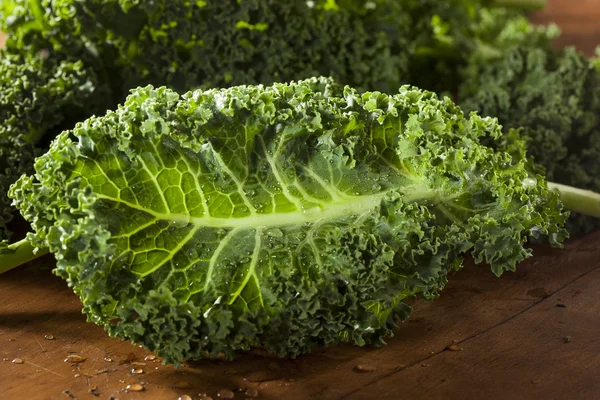
A. Nutritional Benefits Kale is a leafy green vegetable that is high in fiber, vitamins, and minerals. One cup of cooked kale contains approximately 2 grams of fiber, over 200% of the recommended daily intake of vitamin A, and 100% of the recommended daily intake of vitamin C. Additionally, kale is low in calories and is a good source of antioxidants, making it a great food for promoting overall health and wellness.
B. How to Incorporate in Diet Kale can be eaten raw in salads or added to smoothies. It can also be sautéed or roasted and used as a side dish. Kale chips are also a popular snack, made by tossing kale with a small amount of oil and baking until crispy.
C. Health Benefits Kale has been linked to many health benefits, such as improving heart health, promoting healthy skin, and reducing the risk of certain types of cancer. Additionally, the high fiber content in kale can help maintain healthy digestion and promote weight management. The high vitamin A and C content in kale can also help support the immune system and improve the health of the skin.
In conclusion, incorporating kale into a daily diet can bring many health benefits and provide the body with essential vitamins, minerals, and fiber. Whether enjoyed raw or cooked, kale is a delicious and nutritious addition to any meal.
9. Walnuts
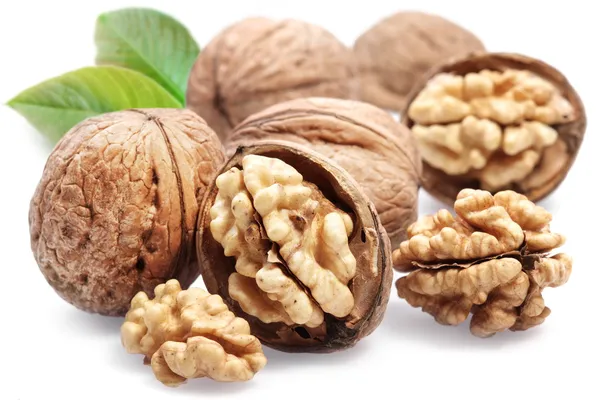
A. Nutritional Benefits Walnuts are a type of tree nut that is high in healthy fats, vitamins, and minerals. One ounce of walnuts contains approximately 4 grams of protein, 2 grams of fiber, and is a good source of healthy unsaturated fats. Additionally, walnuts are a good source of antioxidants, vitamins, and minerals such as magnesium, potassium, and phosphorus.
B. How to Incorporate in Diet Walnuts can be enjoyed as a snack on their own or added to oatmeal, yogurt, or smoothies. They can also be used as a topping for salads or mixed into baked goods such as muffins or bread.
C. Health Benefits Walnuts have been linked to many health benefits, such as improving heart health, promoting healthy brain function, and reducing the risk of certain types of cancer. Additionally, the healthy unsaturated fats in walnuts can help support healthy cholesterol levels and improve overall cardiovascular health. The antioxidants in walnuts can also help protect the body against oxidative stress and promote healthy aging.
In conclusion, incorporating walnuts into a daily diet can bring many health benefits and provide the body with essential vitamins, minerals, and healthy fats. Whether enjoyed as a snack or added to meals, walnuts are a delicious and nutritious addition to any diet
Conclusion
A. Summary of Superfoods In this article, we discussed the top 9 superfoods for optimal health. These superfoods include blueberries, salmon, avocados, spinach, chia seeds, quinoa, sweet potatoes, kale, and walnuts. Each of these superfoods provides a unique set of nutrients and health benefits that can help improve overall health and wellness.
B. Importance of a Balanced Diet It is important to remember that a healthy and balanced diet should not solely consist of superfoods. While these foods can provide many benefits, it is important to include a variety of fruits, vegetables, whole grains, and lean proteins in a daily diet. By incorporating a variety of nutrient-dense foods, a balanced diet can be achieved and optimal health can be maintained.
C. Conclusion In conclusion, incorporating these top 9 superfoods into a daily diet can provide numerous health benefits and help improve overall health and wellness. By including a variety of nutrient-dense foods in a balanced diet, optimal health can be achieved and maintained.
 Reviewed by jadan
on
February 17, 2023
Rating:
Reviewed by jadan
on
February 17, 2023
Rating:




No comments: